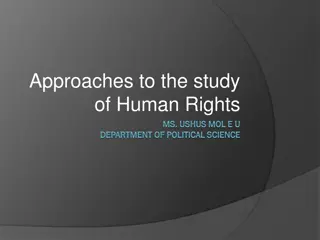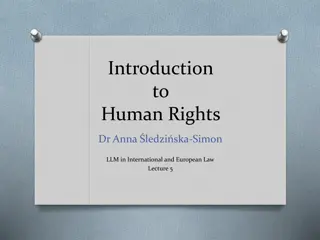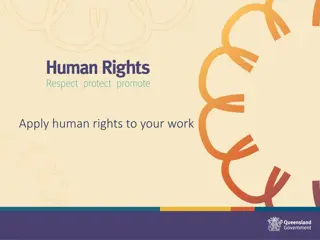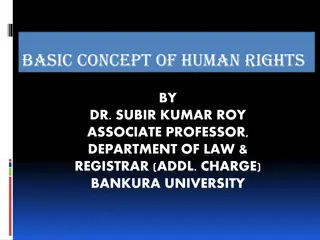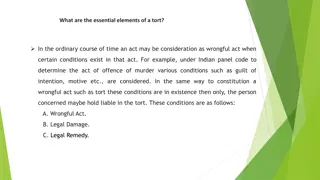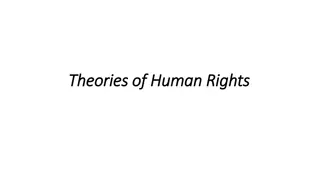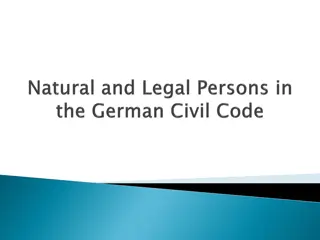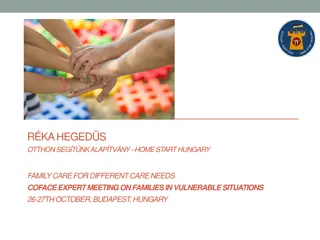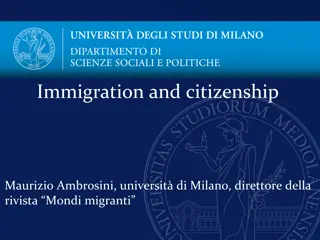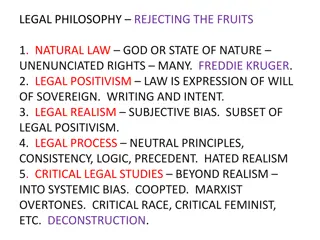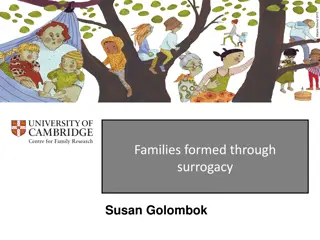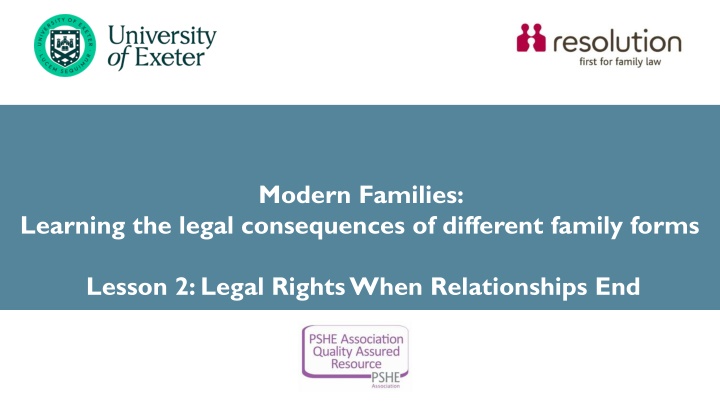
Legal Rights When Relationships End - Modern Families
Learning about the legal consequences of different family forms, including marriage laws, civil partnerships, and rights in relationships. Explore the impact of legal status on relationship breakdowns and protections provided in various relationship forms.
Download Presentation

Please find below an Image/Link to download the presentation.
The content on the website is provided AS IS for your information and personal use only. It may not be sold, licensed, or shared on other websites without obtaining consent from the author. If you encounter any issues during the download, it is possible that the publisher has removed the file from their server.
You are allowed to download the files provided on this website for personal or commercial use, subject to the condition that they are used lawfully. All files are the property of their respective owners.
The content on the website is provided AS IS for your information and personal use only. It may not be sold, licensed, or shared on other websites without obtaining consent from the author.
E N D
Presentation Transcript
Modern Families: Learning the legal consequences of different family forms Lesson 2: Legal Rights When Relationships End
TEACHER SLIDE- PREPARING TO TEACH Preparing to teach and using these slides: The slides headed teacher slides assist the teacher in setting up and running the lesson. Slide 8 onwards are for the pupil facing lesson. Please read the Lesson Plan 2 Teacher Guidance for Modern Families before teaching. Have slides in presenter mode notes are available under each slide to aid teaching. Support: and extension: suggested where appropriate (icons on bottom right corner of slides). Resources: Sticky notes. An ask-it-basket / question box for pupils to ask questions confidentially. Handout for Baseline activity (Resource A) if using. Grid and flashcards (Resources B and C). Information recording sheet (Resource D and slides 16-20). activities are Timing: The lesson is designed to be taught over 55 minutes.
TEACHER SLIDE- DFE GUIDANCE This two-part lesson plan for Key Stage 4 and Key Stage 5 PSHE aims: in lesson 1 to help pupils learn the characteristics and benefits of strong, positive relationships, including mutual support, trust, respect and equality (Programme of Study 2020-2021 KS4, R1). in lessons 1 and 2, to help pupils learn about the importance of stable, committed relationships, including the rights and protections provided within legally recognised marriages and civil partnerships and the legal status of other long- term relationships (Programme of Study 2020-2021 KS4, R4 see also KS5, R1-3). DfE Guidance on RSE states that RSE teaching should: equip pupils with knowledge that will enable them to make informeddecisions about their relationships (para. 1). be based on knowledge of pupils and their circumstances [with] no stigmatisation of children based on their home circumstances (para. 59). teach pupils what marriage is, including their legal status e.g. that marriage carries legal rights and protections not available to couples who are cohabiting or who have married, for example, in an unregistered religious ceremony (para. 81).
TEACHER SLIDE THE LAW ON MARRIAGE FORMATION The principles governing current marriage law date from 1836. It tightly regulates how and where weddings can take place. This differs depending on the type of wedding. At present, couples have to make a choice between a religious or a civil wedding, with no option for a wedding reflecting other beliefs. Couples having an Anglican wedding can give notice to the church; all other couples must give notice at the register office. Until June 2021, couples could not marry or hold a civil partnership ceremony outdoors. Now civil weddings and civil partnerships can be held outdoors provided the venue is licensed. If a couple do not comply with the legal requirements, which may happen with some religious ceremonies, their marriage may not be legally recognised. This means the parties have no legal status or protection. People often only discover their lack of legal status at the time of relationship breakdown.
TEACHER SLIDE NON-QUALIFYING CEREMONIES Myth: A religious wedding only, e.g. an Islamic nikah, will give the couple rights if one person dies or the couple separate. In fact: If acouple has areligious-only ceremony in England and Wales this is not legally binding. It is sometimes referred to as a non-qualifying ceremony . The couple do not have any automatic rights against each other on separation or death, unlike a couple in a valid marriage. The law treats couples who had a non-qualifying ceremony in England and Wales as if they were cohabitants. This can lead to significant inequalities between the couple on separation, with women often most disadvantaged because they may have reduced their hours or stopped working when they became parents. This is a particular problem in the Muslim community where one or both parties may enter a nikah (the religious ceremony) without knowing that it is not a legal marriage. But any religious-only ceremony may result in a non-qualifying ceremony. Similarly, ceremonies led by Humanist or independent celebrants have no legal recognition under the current law.
TEACHER SLIDE THE COMMON LAW MARRIAGE MYTH Myth: After a certain period together/if you have a child together, cohabiting couples have the same rights as married couples: the 'common law marriage myth'. In fact: unlike married or civil partners, cohabiting partners are not entitled to claim financial support from their former partner for themselves if they separate (although both parents must financially support their children). Cohabitation is the fastest growing family form in England. However, many cohabitants do not realise that they do not have the same legal rights as married couples or civil partners. Parents must financially support children, but not each other. Rights to the couple s home are based on property law which, unlike family law, does not take into account contributions towards the family life leaving many stay at home or part-time working mothers financially disadvantaged. In 2018, research by the University of Exeter showed that 47% believed that cohabiting couples form a common law marriage when this is not the case, the so-called common law marriage myth .
TEACHER SLIDE LESSON OUTLINE AND TIMINGS Activity Description Suggested timing 3 minutes 5 minutes 10 minutes Introduction Baseline activity Rights and protections Differences in rights and protections Ground rules, learning objectives and outcomes. Pupils will consider what rights they think couples who live together should have. Pupils will complete a grid by choosing from a set of flashcards the rights and protections given to three different family forms. Pupils will learn about the differences in rights and protections that married couples or couples in a civil partnership have compared to cohabitants or couples who had a non-qualifying ceremony and steps that couples can take to protect their rights. Pupils will apply the learning to a set of scenarios. Pupils will be asked to imagine that they have been given the responsibility to draft a new law for cohabitants what would it include and when would it apply? Pupils will complete an exit slip that will show whether their views have changed from the baseline activity. Homework/extension Wrap up and setting homework (or extension) task. 15 minutes Lawmaker for a day 15 minutes Endpoint assessment 5 minutes 2 minutes
GROUND RULES We will: keep anything that others say confidential talk about someone I know rather than using a person s name comment on what is said, not who has said it have the right to pass ensure that comments or views expressed are respectful of different family forms, cultures and beliefs seek help in school/encourage friends to seek help if needed. We will not: disclose personal information about ourselves or others judge others put anyone on the spot ask personal questions or try to embarrass someone.
MODERN FAMILIES LESSON 2 Learning Objective: - To learn about key differences in legal rights between couples who are legally married or in a civil partnership and couples in a non-legally binding relationships, and why it is important to know these differences.
MODERN FAMILIES LESSON 2 Learning Outcomes - Pupils will be able to: Describe the legal rights of couples who are legally married or in a civil partnership. Analyse the reasons why a couple may or may not choose to marry or have a civil partnership. Explain the consequences of not having a legally binding relationship.
BASELINE ACTIVITY: WHO SHOULD HAVE RIGHTS? strongly disagree disagree neither agree nor disagree agree strongly agree Statement 1. Couples who marry are more committed than couples who live together without marrying. 2. Couples can choose to marry or have a civil partnership so there is no need for rights for couples who live together. 3. All couples who live together should have the same rights as couples who marry or have a civil partnership. 4. Couples who live together should have the same rights as couples who marry or have a civil partnership but only after they have lived together for at least two years. 5. Couples who live together should have the same rights as couples who marry or have a civil partnership but only if they have a child together.
Religious and civil wedding Civil partners Cohabitants Rent a house Have a child together (own or by adoption) Buy a house Couple separates What happens if one of them dies without a will?
Religious and civil wedding Civil partners Cohabitants The couple both have a right to occupy the home if the tenancy is held in joint names. If the tenancy is in one person s name the other can occupy only if that person agrees. The couple both have a right to occupy the home, regardless of in whose name the tenancy is held. Rent a house The couple both have a right to occupy the home, regardless of in whose name the tenancy is held. Rent a house Rent a house Rent a house Fathers in mixed-sex relationships share rights and responsibilities for the child equally with the mother if the father is registered on the birth certificate. Have a child together (own or by adoption or surrogacy) Parents share rights and responsibilities for the child equally. Have a child Parents share rights and responsibilities for the child equally. Have a child Have a child The couple both have a right to occupy and a share, regardless of in whose name the property is held. The couple both have a right to occupy and a share, regardless of in whose name the property is held. Rights to occupy and to a share depend on in whose name the property is held, and the financial contributions made. Buy a house Buy a house Buy a house Buy a house Assets divided according to legal ownership unless contributions establish an interest. No right to income. Couple separates Assets and income divided according to needs. Couple separates Couple separates Assets and income divided according to needs. Couple separates Survivor gets all the assets if no children or first 270,000 + half of what s left if children. Survivor gets all the assets if no children or first 270,000 + half of what s left if children. Survivor has no automatic right to the assets owned by the person who has died. What happens if one of them dies without a will? What would happen if one dies? What would happen if one dies? What would happen if one dies?
RENTING A HOME Married couples and civil partners: Have home rights so are entitled to stay in the home while they are married or in a civil partnership even if the tenancy is in the spouse or partner s name only. Cohabitants and couples with a non- qualifying ceremony: Have no automatic right to stay in the home if the tenancy is in the partner s name only. What should couples do? Cohabitants should agree with their landlord to put the tenancy in both their names if they can, and make sure they each understand their rights and obligations as tenants.
HAVING A CHILD Married couples and civil partners: The child s father and mother share parental responsibility if they are married or in a civil partnership, as do most same-sex couples if they are married or in a civil partnership, provided the child was conceived via a clinic. Married or CP step-parents can acquire PR if the parent who is not their partner/spouse agrees. Same-sex fathers married or in a CP may acquire PR through adoption or surrogacy. Cohabitants and couples who had a non-qualifying ceremony: All mothers have PR but fathers in opposite sex couples do not have automatic rights although most have PR as fathers who are registered on the birth certificate have PR Same-sex fathers may acquire PR through adoption or surrogacy. What should couples do? Cohabitants and couples who had a non-qualifying ceremony should register the birth jointly.
BUYING A HOME Married couples and civil partners: Have home rights so are entitled to stay in the home while they are married or in a civil partnership even if the tenancy is in the spouse or partner s name only. Cohabitants and couples who had a non- qualifying ceremony: Have no automatic right to occupy if the house is in the partner s name only. They need to prove that they have an interest because they contributed to the purchase or made some other financial contribution. What should couples do? Register home rights if married or in a civil partnership. All couples should sign a legal document known as a Declaration of Trust when buying the house which lists each person s contribution and what share they will each have in the house. Why might someone contribute towards purchasing a property but agree to it being bought in the partner s name only?
SPLITTING UP Married couples and civil partners: The starting point for dividing the assets is 50/50. One person can be awarded more if required e.g. to meet their housing needs. One person may have to make monthly payments to the other if needed. Cohabitants and couples who had a non- qualifying ceremony: The starting point for dividing the assets is each person keeps any assets in their own name and they share joint assets equally. A person will only get a share of asset in the other person s name if they contributed to the purchase price. There is no right to income from the other person other than to meet the expenses of caring for a child. What should couples do? Before the couple marry or enter a civil partnership, they should consider having a pre-nuptial agreement. Cohabitants should consider a cohabitation agreement before living together. What is a pre-nuptial agreement? A voluntary agreement the couple signs before the marriage/CP which may be binding if fair.
ONE PERSON DYING WITHOUT A WILL Married couples and civil partners: If there are no children, the surviving spouse/civil partner gets all the assets. If there are children, the surviving spouse/civil partner gets the first 270,000 plus half of what is left. If the survivor is under the state retirement age, a Bereavement Support Payment is payable of up to 3500 then 350pm for 18 months. Cohabitants and couples who had a non-qualifying ceremony: The surviving partner has no automatic right to the assets owned by the person who has died. If the survivor is under the state retirement age, a Bereavement Support Payment is payable of up to 3500 then 350pm for 18 months. What should couples do? Each person should make a will setting out who will inherit their assets if they die.
LAWMAKER FOR A DAY! You have been given the responsibility to draft a new law for cohabitants. List: The key rights that you would grant to cohabitants (if any). When cohabitants should start to have these rights. Why might some cohabitants be opposed to marriage or civil partnership? Should people be allowed to opt out of any automatic rights for cohabitants that might be introduced? Why/why not?
ENDPOINT ASSESSMENT ACTIVITY getting married is the best option for all couples! Complete an exit slip stating who you think should have rights if a relationship breaks down. Have your views changed during the lesson? What would you say to someone who says, getting married is the best option for all couples! ?
HOMEWORK OR EXTENSION TASK Before the next lesson Produce a poster setting out considerations people should think about if they are wondering whether to get married/form a civil partnership.
FURTHER HELP AND SUPPORT For further help and support in school contact: Your form teacher/ PSHE teacher Your Head of Year The pastoral support team For further help and support outside of school: ChildLine: https://www.childline.org.uk Muslim Youth helpline: https://myh.org.uk/ National Youth Advocacy Service: https://NYAS.net Citizen s Advice: https://www.citizensadvice.org.uk AdviceNow: https://www.advicenow.org.uk/
Resource A: Grid for baseline activity; Resource B: Grid for core activity and Resource C: Flashcards for printing (front and back) Resource D: Information recording sheet
BASELINE ACTIVITY: WHO SHOULD HAVE RIGHTS? strongly disagree disagree neither agree nor disagree agree strongly agree Statement 1. Couples who marry are more committed than couples who live together without marrying. 2. Couples can choose to marry or have a civil partnership so there is no need for rights for couples who live together. 3. All couples who live together should have the same rights as couples who marry or have a civil partnership. 4. Couples who live together should have the same rights as couples who marry or have a civil partnership but only after they have lived together for at least two years. 5. Couples who live together should have the same rights as couples who marry or have a civil partnership but only if they have a child together.
Religious and civil wedding Rent a house Have a child together (own or by adoption) Buy a house Couple separates What happens if one of them dies without a will?
The couple both have a right to occupy the home if the tenancy is held in joint names. If the m can occupy only if that person agrees. g . g . b g m m . b g m m . m m The couple both have a right to occupy the home, regardless of in whose name the tenancy is held. g m . g m . The couple both have a right to occupy the home, regardless of in whose name the tenancy is held. g m . g m . b g m b g m b g m b g m m g m g b q b q m g b g g g g Parents share rights and b q . b q . b q . Parents share rights and b q . b q . b q . Parents share rights and b q . m g b . . b g b g A g g g m A m g . A m g . g m . A m g . A m g . g m . A m g . b b . g m . b m . The couple both have a right to occupy and a share, regardless of in whose name the property . . The couple both have a right to occupy and a share, regardless of in whose name the property . . b g g m A m g . b g g m A m g . g m A m g . Rights to occupy and to a share depend on in whose name the property is held, and the b m . b m . g g g g Survivor gets all the assets if no children or first 270,000 + half of what is left . . . Survivor gets all the assets if no children or first 270,000 + half of what is left . . . m g m g Survivor has no automatic right to the b . b . b .
Legal rights I don't feel ready to get married, but I want to move in with my partner. What would happen if we later split up? I am expecting a baby with my male partner, but we aren t married. Do we need to do anything to make sure we both have parental responsibility? My best friend has agreed to buy a house with their partner, but only in the partner's name even though she is paying some of the deposit. Is there anything she can do to protect her deposit in case they ever split up? My older brother and his partner are getting married soon, and they keep talking about arranging a pre-nuptial agreement . What is that? Is it something you have to do before you get married? My elderly neighbours got married last month so that they would be looked after if either of them died, but wouldn t their money have gone to each other even if they weren t married? They ve been together for 40 years!

